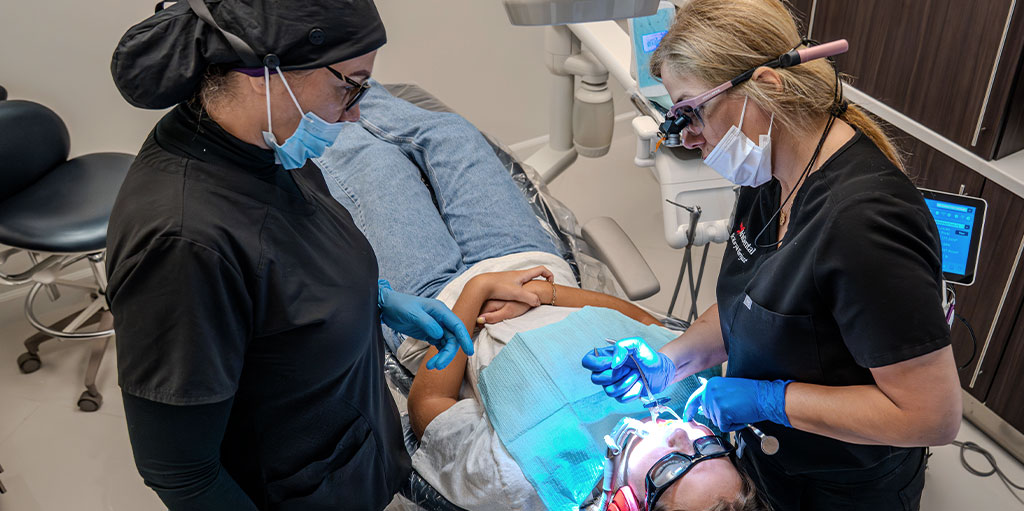A toothache is one of the most common and annoying pains that any person can experience during their lifetime. But there are ways to prevent toothache and other oral diseases. Maintaining good oral hygiene is the easiest way to prevent serious diseases in the mouth. We have prepared a comprehensive guide for you in which we will share with you oral hygiene best practices.
What Is Oral Hygiene?
For many of us, having a beautiful smile and a mouth free of bad breath is equal to oral hygiene. But oral hygiene is more than just having a good smile. For example, despite many efforts to treat cavities, tooth decay is still one of the most common chronic diseases in children. Of course, tooth decay is almost completely preventable. If we know how to improve oral hygiene, we can have a clean mouth free of diseases and problems.
Why Is Oral Hygiene Important?
Oral hygiene is very important for the overall health of the body. Maintaining good oral hygiene helps prevent oral diseases such as cavities and gum disease in the first place and can further reduce the risk of more serious diseases such as heart disease, stroke, and diabetes. Healthy and strong teeth are effective in improving digestive function and the better digestion of food.
Oral hygiene not only affects the physical health of individuals but also affects the appearance and self-confidence of a person. Ultimately, preventing oral diseases by maintaining oral hygiene means saving on dental treatment costs.
What Are The Signs of Poor Oral Hygiene?
Signs of poor oral hygiene include:
- Bleeding and inflamed gums: Healthy gums are pink and firm and should not bleed when you brush or floss. Bleeding and inflamed gums can be a sign of gum disease.
- Mouth sores: You may get mouth sores when you accidentally bite your mouth or eat something very hot. However, sores that appear out of nowhere are a cause for concern and should be checked regularly because they can be a sign of other conditions.
- Bad breath (Halitosis): Bad breath can be caused by bacteria in the mouth breaking down food particles.
- Tooth sensitivity: Sensitivity to hot or cold foods and drinks can be a sign of tooth enamel erosion or other problems. Sometimes, this sign can be relieved by using certain brands of toothpaste and mouthwash. However, tooth sensitivity should not be ignored.
- Jaw, tooth, and gum pain: Tooth and gum pain can be caused by tooth decay, gum infection, or other oral health problems. However, pain in the jaw or mouth is not always related to oral hygiene and can sometimes be related to stress, so it’s important to see a dentist for a toothache.
- Loose teeth: Loose teeth can be caused by gum disease, trauma, or other problems.
- Gingivitis: Gum recession means that the gums pull away from the teeth, exposing the roots of the teeth. This can be caused by gum disease or improper brushing.
- Dry mouth (Xerostomia): Dry mouth is often caused by dehydration, but it can also be caused by other conditions, such as diabetes or Sjögren’s syndrome.
The problems above can be symptoms of poor oral hygiene or oral health problems. You should see a dentist if you experience any of these symptoms and have your mouth checked.
Brush Daily
It’s time to know how to improve oral hygiene. The first and most important thing is to brush your teeth twice a day. Take enough time to brush your teeth and clean all surfaces of your teeth. Brushing should usually take about two minutes.
For most adults, a toothbrush with a small head and dense bristles is suitable. It is better if the bristles are at different angles and have a combination of long and short bristles. Choose a soft toothbrush. Because very hard toothbrushes can damage tooth enamel and gums. The bristles of the toothbrush should bend easily so that they can clean under the gums and other corners.
Wash Your Toothbrush Holder
Keeping your toothbrush clean is just as important as brushing your teeth. After you’re done brushing, rinse your toothbrush and squeeze out excess water. After washing your toothbrush, place it in a clean, airy place to dry. A humid environment promotes the growth of bacteria or mold, compromising oral hygiene.
Keep your toothbrush holder clean, too. Clean your toothbrush holder regularly with soap and water. Use disposable wipes to wipe down your wall-mounted toothbrush holder and cups. Clean your countertops and sinks regularly. This will remove any saliva and excess toothpaste.
Use Dental Floss
Flossing is an important oral hygiene practice that helps maintain healthy teeth and gums. It helps remove plaque and food particles from between teeth and below the gum line, where a toothbrush alone cannot reach. Regular flossing helps prevent tooth decay, gum disease, and bad breath.
Use An Antibacterial Mouthwash

Antibacterial mouthwashes play an important role in oral hygiene and can help reduce harmful bacteria in the mouth, thereby helping to prevent tooth decay and gum disease. Reducing bad breath and strengthening tooth enamel are other benefits of using mouthwash.
Nonetheless, it’s crucial to remember that mouthwash should complement routines of brushing and flossing, but cannot replace them. With a multitude of mouthwash varieties in the market, seeking advice from your dentist before selecting one ensures you opt for the most suitable mouthwash for your specific requirements.
Avoid Smoking
Smoking restricts blood flow to the mouth, making it a breeding ground for bacteria. Bad breath and yellow teeth are other symptoms that bother smokers. In addition, smoking is a risk factor for serious diseases such as oral cancer. So quitting smoking can have a huge impact on your oral hygiene.
Eat Teeth-whitening Foods
We can also help improve our oral hygiene by eating well. There are several foods that can help whiten teeth, including dairy products like cheese, yogurt, and milk, fruits like strawberries and apples, and vegetables like broccoli and lettuce. Try to include these foods in your diet and avoid foods that are high in sugar and low in nutritional value, like soda, fruit juices, candies, pastries, dried fruits, white bread, and potato chips.
Visit Your Dentist Regularly

According to the American Dental Association, one in three Americans had dental needs in 2024. Checkups allow your dentist to identify and treat problems early, preventing them from progressing. This reduces dental costs and makes treatment faster and more convenient.
It is generally recommended that you visit your dentist every 6 months for regular checkups. However, some people may need to visit the dentist more often due to certain conditions. In this case, your dentist can adjust the appropriate checkup intervals based on your needs.
When should I see a doctor?
As we mentioned earlier, following the principles of oral hygiene and visiting the dentist every six months is appropriate for most people. Regular check-ups are necessary to prevent oral and dental problems. However, if you feel pain or notice a change in the appearance of your teeth and gums, do not hesitate to visit a dentist. The experienced specialists at Aria Dental are ready to perform examinations, guide you, and provide the treatments you need.















